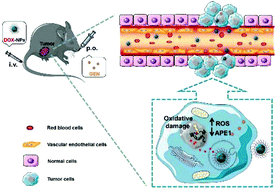Co-administration of genistein with doxorubicin-loaded polypeptide nanoparticles weakens the metastasis of malignant prostate cancer by amplifying oxidative damage†
Abstract
Prostate cancer is a typical malignant disease with a high incidence and a poor prognosis. Doxorubicin hydrochloride (DOX·HCl) is one of the most effective agents in the treatment of prostate cancer, but severe side effects and metastasis after its treatment impose restrictions on its application. Herein, a combination of genistein (GEN) and doxorubicin-loaded polypeptide nanoparticles (DOX-NPs) is constructed for the treatment of prostate cancer. The DOX-NPs can reduce the side effects caused by free DOX·HCl and produce a relatively low level of intracellular reactive oxygen species (ROS)-induced oxidative damage, while GEN, an inhibitor of the oxidative DNA repair enzyme apurinic/apyrimidinic endonuclease1 (APE1), can further amplify the ROS-induced oxidative damage by downregulating the intracellular expression of APE1 and reducing oxidative DNA repair in the prostate cancer cells. Because high levels of ROS-induced oxidative damage can prevent the distant metastasis of tumor cells, the distant metastasis of malignant prostate cancer cells is significantly inhibited by the combination of genistein and DOX-NPs with amplified oxidative damage.



 Please wait while we load your content...
Please wait while we load your content...